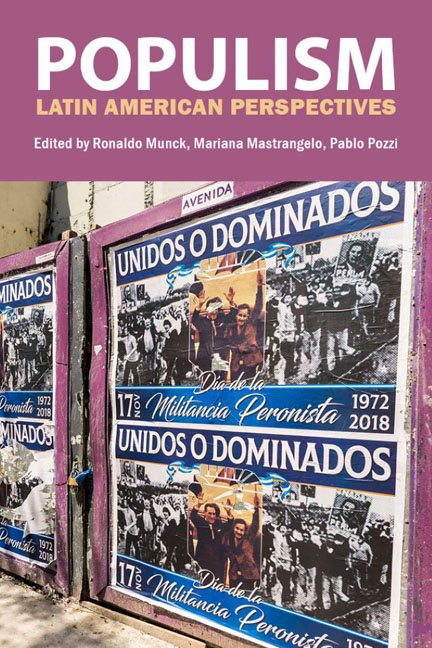Book contents
- Frontmatter
- Contents
- Abbreviations and acronyms
- Foreword
- Introduction
- 1 Populism in Latin America: development, democracy and social transformation
- 2 Peronism in Argentina: left or right?
- 3 The populist left in Chile: socialists and communists from 1936 to 1973
- 4 The left and the Workers’ Party in Brazil: a party between populism, social policies and the popular vote
- 5 Brazil, Bolsonaro and populism of the right
- 6 Political dilemmas of the government of López Obrador: between populism, democracy and the left in Mexico
- 7 The Bolivarian process in Venezuela: socialism, populism or neoliberalism?
- 8 Populist responses to crises of market democracy: the case of Bolivia’s Evo Morales
- 9 Ecuador: populism and the 2007– 17 political cycle
- 10 The Nicaraguan crisis and the mirage of left populism
- 11 Populism and the right in Latin America
- 12 Populism and the left in Latin America
- Afterword: a tale of two “people”: national popular and twenty-first-century Latin American populisms
- Contributors
- Index
9 - Ecuador: populism and the 2007– 17 political cycle
Published online by Cambridge University Press: 23 January 2024
- Frontmatter
- Contents
- Abbreviations and acronyms
- Foreword
- Introduction
- 1 Populism in Latin America: development, democracy and social transformation
- 2 Peronism in Argentina: left or right?
- 3 The populist left in Chile: socialists and communists from 1936 to 1973
- 4 The left and the Workers’ Party in Brazil: a party between populism, social policies and the popular vote
- 5 Brazil, Bolsonaro and populism of the right
- 6 Political dilemmas of the government of López Obrador: between populism, democracy and the left in Mexico
- 7 The Bolivarian process in Venezuela: socialism, populism or neoliberalism?
- 8 Populist responses to crises of market democracy: the case of Bolivia’s Evo Morales
- 9 Ecuador: populism and the 2007– 17 political cycle
- 10 The Nicaraguan crisis and the mirage of left populism
- 11 Populism and the right in Latin America
- 12 Populism and the left in Latin America
- Afterword: a tale of two “people”: national popular and twenty-first-century Latin American populisms
- Contributors
- Index
Summary
INTRODUCTION
In the international debate on populism, the Argentine political philosopher, Ernesto Laclau, achieved a key epistemological shift, when he ascribed populism to the ways of constructing the political within a logic of articulations, in a dynamic of equivalences and heterogeneities (Laclau 2005). Thus, for Laclau “populism is simply a way of constructing the political”, and the political is always populist (Laclau 2005: 11). In this way, he counteracts the type of consensus that presented populism as a threat to liberal democracy, as well as broadening the field of possible theorists for the debate on populism.
Laclau's epistemological turn is based on the theoretical weaknesses of the concept of populism, and its inability to generate a canonical definition. The resistance to granting a strong epistemological support to this notion of populism is due to a position of principle, with respect to the theorization of liberal democracy, that is universal and teleological, and with a political subject that is essentially grounded. That is why, from this point of view, populism is considered as a syndrome of liberal democracy (Wiles 1969), or as a pathology of societies in full economic development and political modernization, that would prevent such development and economic growth (Edwards 2019).
The presence of the charismatic leader who turned the people against the oligarchies and polarized the political system within a Manichean strategy, takes up Carl Schmitt's friend/enemy notion. While this can somehow describe populism, in reality, it does not explain it epistemologically (Tushnet 2019). The aporia of liberalism that prevents that conceptualization is that, without the construction of the “people”, there is no populism, but neither is there democracy (Laclau 2005: 213). Precisely because of this, Laclau proposes to change strategy and not to ask what populism is (because there is still no epistemologically convincing answer on its definition), but rather to ask: “to what social and political reality does populism refer? … of what reality or social situation is populism an expression” (Laclau 2005: 31). In this way, and as Peruzzotti puts it, Laclau “turned the debate on populism on its head” (Peruzzotti 2019: 33).
- Type
- Chapter
- Information
- PopulismLatin American Perspectives, pp. 159 - 174Publisher: Agenda PublishingPrint publication year: 2023



